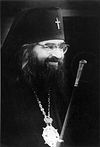

| Previous day | Next day |
| Old Style
June 19
|
Saturday |
New Style
July 2
|
|
3rd Week after Pentecost.
Tone 1.
Fast of the Holy Apostles. |
Fish, wine and oil allowed.
|
![]() Holy Apostle Jude, the Brother of the Lord (ca. 80).
Holy Apostle Jude, the Brother of the Lord (ca. 80). ![]() St. Job, patriarch of Moscow (1607).
St. Job, patriarch of Moscow (1607). ![]() St. John (Maximovitch), archbishop of Shanghai and San Francisco (1966).
St. John (Maximovitch), archbishop of Shanghai and San Francisco (1966).
Martyr Zosimas the Soldier, at Antioch in Pisidia (ca. 89-117). St. Paisius the Great, of Egypt (5th c.). St. John the Solitary, of Jerusalem (6th c.). St. Barlaam, monk of Shenkursk (1462). St. Paisius the Bulgarian, of Hilandar, Mt. Athos (18th c.).
Holy Myrrh-bearer Mary, mother of Apostle James (1st c.). St. Macarius of Petra (4th c.). St. Romuald, abbot of Camaldoli (Ravenna) (1027). Hieromartyr Asyncretus.
Repose of Schemamonk Theoktist, desert-dweller, of Valaam (1863) and Archbishop Leonty of Chile (1971).
Thoughts for Each Day of the Year
According to the Daily Church Readings from the Word of God
By St. Theophan the Recluse

Saturday. [Rom. 3:28-4:3; Matt. 7:24-8:4]
The present Gospel reading says that one who hears the sayings of the Lord and does them is like one who builds a house upon a rock; but one who hears them and does not do them is like one who builds a house upon the sand. Everyone should learn this by heart and repeat it often; the truth contained in it is graphically clear and anyone can understand it. Everyone has had many experiences of this. Take your thoughts, for example. While you are thinking about something, they are unstable and restless, but when you write them down, they become solid and fixed. The outcome of any project is unsure and its details can change many times before it is begun; yet any further cogitation ceases once you have set it in motion. In this manner, moral rules are alien to us when not fulfilled, they are outside of us and shaky. But when we fulfil them, they enter within, settle in the heart and form the basis of our character—good or evil. See then that ye walk circumspectly, not as fools, but as wise (Eph. 5:15).
Articles
 Opening of the Relics, and Glorification of St. John MaximovitchArchpriest Peter Perekrestov"He is incorrupt! His relics are incorrupt!" |
 Martyr Zosimus the Soldier at Antioch, in PisidiaThe Martyr Zosimus lived in the city of Apollona (Thrace) during the reign of Trajan (89-117), the persecutor of Christians. |
 St John the Solitary of JerusalemSaint John the Hermit was an ascetic in Palestine. He passed his days in fasting and prayer in a cave near Jerusalem. |















